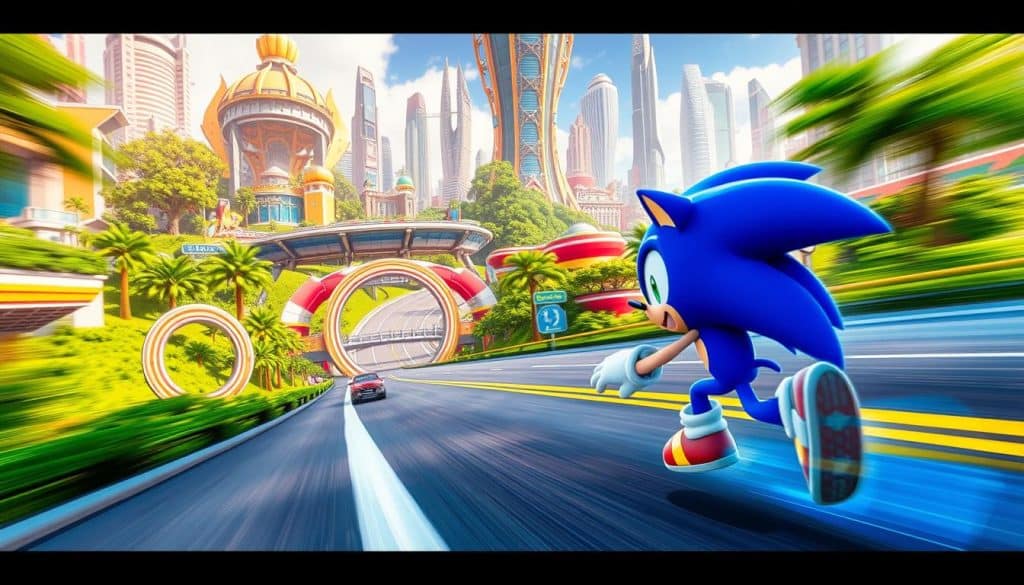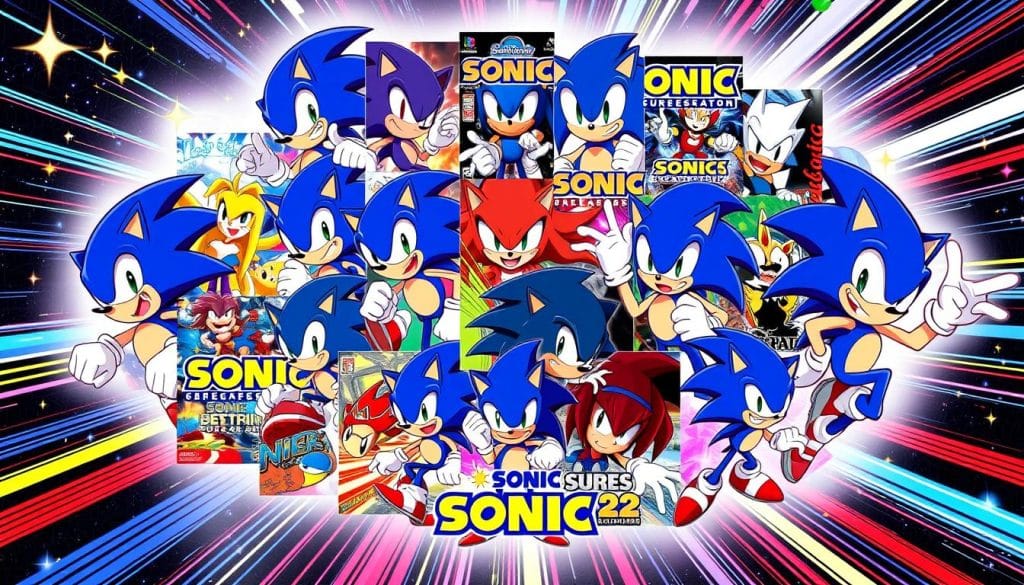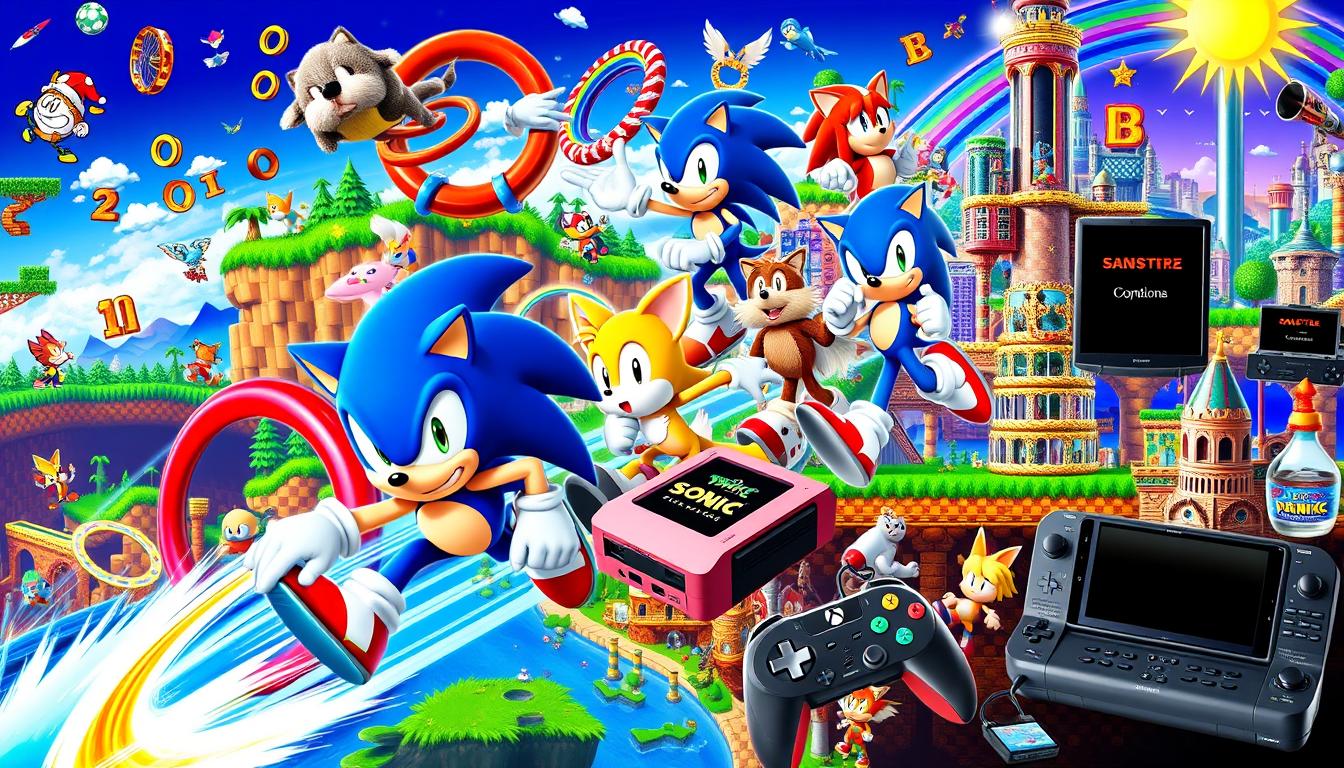What makes a video game character iconic and a cultural phenomenon? The sonic franchise and its hero, Sonic the Hedgehog, are a great example. Born in the early 1990s, Sonic quickly became more than a character. He symbolized a new era in gaming, challenging the big names.
This article looks at the rich history and impact of the sonic franchise. It covers its start, its growth into a vast universe, and its influence on pop culture. The franchise’s journey shows its lasting appeal and success.
Key Takeaways
- The sonic franchise has sold over 140 million copies, highlighting its lasting popularity.
- Sonic the Hedgehog helped Sega capture 65% of the North American market share against Nintendo.
- The franchise grossed over $5 billion as of 2014, showing its commercial success.
- Sonic’s character development from a lonely kid to a team leader resonates with audiences.
- The introduction of new characters like Knuckles and Shadow enhances the storytelling depth.
- Sonic’s growth has influenced not only gaming but also film and television adaptations.
- The sustained success of the sonic franchise reflects the changing nature of gaming and culture.
The Origins of the Sonic Franchise
The Sonic franchise started in the early 1990s. Sega was looking for a mascot to compete with Nintendo’s Mario. A team of fifteen at Sega’s “AM8” studio created Sonic the Hedgehog.
They hoped Sonic would win over gamers’ hearts.
The Creation of Sonic the Hedgehog
Sega held a contest to find a new mascot. A blue hedgehog was chosen, with spiky hair and red shoes. This design showed speed and attitude, qualities Sega wanted to share.
This change marked a new direction for Sega, leaving behind Alex Kidd.
Early Development Challenges
The team faced many challenges early on. They struggled to make the game both fun and fast. They worked hard to perfect the levels and controls.
After many tries, they created a game that met gamers’ high expectations.
The 1991 Release and Immediate Impact
The first Sonic game was released on June 23, 1991. It was a huge success for Sega. Sonic quickly became Sega’s mascot, beating out Mario and Mickey Mouse.
The game’s success changed platform gaming. It introduced new ideas and a beloved character. Sonic’s fame led to a big franchise with games, cartoons, and more.
Iconic Characters and Their Development
Character development is key in the Sonic franchise, making it so appealing. The franchise is filled with characters, each with their own traits that have grown over time. Sonic, known for his speed and attitude, is at the heart of the franchise. He started in 1991 and has been a hit ever.
His stories often include Tails, creating exciting partnerships. Together, Sonic and Tails face many challenges, making their bond stronger.
Sonic: The Blue Blur
Sonic has grown a lot in the franchise. He’s moved from just being fast to being brave, loyal, and determined. This growth is seen in many games, showing his personality through his actions.
The use of vocal themes in games like Sonic Adventure made him more relatable. It helped players connect with him on a deeper level.
Dr. Robotnik: The Archenemy
Dr. Robotnik is Sonic’s main enemy, known for his clever plans. His character adds depth to the franchise. Fans see his endless efforts to catch Sonic and stop his adventures.
Players enjoy learning about Dr. Robotnik’s backstory and reasons for his actions. Each battle shows his creativity and the obstacles he sets up, highlighting the eternal fight between good and evil.
Supporting Cast: Tails, Knuckles, and Amy
The supporting cast, like Tails, Knuckles, and Amy, makes the Sonic world richer. Tails is Sonic’s tech-savvy and innocent friend, adding to their friendship. Knuckles is the strong but vulnerable protector of the Master Emerald. Amy has grown from a lovesick girl to a strong leader.
Each character has their own story and abilities, adding to the franchise’s richness. For more on each character, check out this list of Sonic characters that explores their roles in the franchise.
Evolution of Gameplay Mechanics
The Sonic franchise has seen a big change in evolution of gameplay mechanics. It started with simple 2D games and moved to more complex 3D ones. This change made the games better and opened up new ways to design levels and gameplay.
Transition from 2D to 3D
The move from 2D to 3D was a big step for Sonic. Sonic Adventure, out in 1998, brought a 3D world to players. This new world brought new challenges and goals that 2D games couldn’t offer.
Later, games like Sonic Generations showed both old and new styles. This let fans see Sonic’s history while enjoying new features.
Key Gameplay Features Over the Years
Speed has always been key in Sonic games. Players have to move fast through colorful levels. Games also added power-ups and shields, letting players play in their own way.
Sonic Generations, for example, had Classic and Modern styles. These styles appealed to both old fans and new players.
Influence of Racing and Spin-off Titles
Racing games added a new twist to Sonic. They showed off character skills and competition. Games like Sonic & All-Stars Racing Transformed brought new experiences and arenas.
These changes made Sonic more appealing to a wider audience. They showed Sonic’s ability to go beyond just platforming.
Merchandise and Brand Expansion
The Sonic the Hedgehog franchise has grown beyond video games. It now includes toys, clothing, and collectibles. These items are loved by fans of all ages, showing Sonic’s lasting appeal. Sonic toys, like figures and plush toys, bring the games to life.
Collectors look for rare items, making Sonic a big part of pop culture.
Toys, Clothing, and Collectibles
Many stores now sell Sonic merchandise, from cool clothes to fun collectibles. Sonic-themed clothes, with his blue color and fun sayings, are popular. Fans wear these items to show their love for Sonic.
Collectibles, like items from the games, connect fans to Sonic’s world. They make the franchise even more special.
The Impact of Comic Books and Animations
Comic books and animated shows have made Sonic’s story bigger. Sonic comics have given us deeper looks into the characters. They add to the franchise’s history.
Sonic animations on TV and online have brought in new fans. They see Sonic’s adventures and his friends. This has grown a strong fan base, making Sonic loved by many.
Sonic in the Digital Age
The digital age changed Sonic a lot, making it easier for more people to enjoy. Sonic mobile games brought classic Sonic to new fans. Games like Sonic Dash and Sonic Forces are hits because they keep the fast action fans love, but for mobile players.
This change not only brought new life to Sonic but also showed its strength in a new area.
Mobile Gaming Breakthroughs
Sonic mobile games have been huge hits, drawing in fans and growing the franchise. They offer easy-to-play games and fun levels, keeping Sonic’s spirit alive. These games let fans play Sonic anywhere, showing how he stays relevant today.
The digital growth of Sonic shows how he can adapt and connect with both old and new fans.
The Rise of Sonic in Online Communities
Online Sonic communities have grown, giving fans places to be creative and talk. These areas are full of discussions on games, art, and more, boosting fan engagement. They show the strong community spirit of Sonic, where fans share their love and stories.
As Sonic keeps growing online, these communities are key in keeping the excitement alive and growing Sonic’s world.
Sonic Franchise in Popular Culture
The Sonic the Hedgehog franchise has made a big splash in popular culture. It has grown beyond video games into movies and TV shows. Sonic is now a well-known icon across many groups.
This growth includes hit Sonic movies and TV series. These have won over many fans’ hearts.
Film Adaptations: Success and Reception
The Sonic movies, like Sonic the Hedgehog and its sequel, brought the franchise back into the spotlight. They got mixed reviews but showed Sonic’s charm on the big screen. This move showed how Sonic became a big name in movies.
Sonic’s Presence in Television
Sonic TV shows have been key in defining the franchise. They introduced Sonic to new fans, winning their hearts. These shows highlight Sonic’s bravery and speed, along with his friends.
Collaborations with Other Brands
Sonic’s team-ups with other brands have boosted his fame in pop culture. These partnerships have made Sonic more visible and shown his flexibility. Through marketing and co-branded items, Sonic has become a favorite in entertainment.

Community Engagement and Fan Contributions
The Sonic community is all about creativity and passion. Fans play a big role in making the franchise what it is today. By making Sonic fan games, they show off their skills and imagination.
These projects not only entertain but also make the Sonic world more exciting for everyone.
Fan Games and Creative Projects
Sonic fan games are a key part of the community. People with talent come together to make new versions of Sonic. They mix old-school charm with new ideas, making Sonic’s adventures even more thrilling.
It shows how much fans love the series. Their hard work and dedication are truly inspiring.
Fan Conventions and Events
Sonic conventions are where fans meet and share their love for the series. Events like the Sonic Official Fan Meeting Tour bring fans together. They do fun activities like making Sonic-themed paper lanterns and talking to the development team.
These events make fans feel like they belong. They get to meet the characters and creators they love.
The Role of Social Media in Engagement
Sonic social media is key in today’s world. Events like the Sonic Social Takeover in 2023 let fans ask questions to Sonic characters. It became a global hit, showing how excited fans are.
Platforms like Twitter and TikTok help fans share news and events. They keep the community connected, both online and in real life.
Critical Reception Over the Years
The journey of Sonic the Hedgehog in gaming is filled with ups and downs. Different games in the series have gotten mixed reviews. This has shaped Sonic’s image over time.
Review Histories of Major Releases
Some games have sparked big debates in the gaming world. For example, SONIC X SHADOW GENERATIONS got high praise. Critics gave it scores from 8.5/10 to 9/10.
Outlets like IGN, GameRant, and Movie Games and Tech praised it. It had a Metacritic score of 80/100. This shows the series has a bright future.
Fan Favorites vs. Critical Darlings
Some games are loved by fans, but critics have different opinions. The first Sonic movie got a 64% critics rating but a 93% audience score. The second movie did slightly better, with a 69% critics rating and a 96% audience score.
The third movie is a big hit, with an 86% critics rating and a 98% audience score. This shows Sonic games are trying to please everyone.
The Evolution of Sonic’s Reputation
Sonic’s image has changed a lot over the years. Games and movies have improved a lot. Sonic the Hedgehog 3 is a great example, showing big steps forward.
This growth has made Sonic more popular in gaming and entertainment. It’s a big step for the brand.

The Future of the Sonic Franchise
The Sonic franchise is set for a bright future with new games and movies coming. “Sonic the Hedgehog 4” is expected in spring 2027, following the success of earlier games. It will include beloved characters and introduce new storylines inspired by Sonic CD and Sonic Advance.
Upcoming Game Releases
New Sonic games will bring fresh stories and gameplay to fans. They will include time travel and the Chaos Emeralds, keeping Sonic’s legacy alive. Fans are eagerly waiting for “Sonic the Hedgehog 4,” which promises to blend classic and modern elements.
Innovations in Storytelling and Technology
Storytelling and technology will drive the Sonic franchise forward. The games will focus on deeper character stories, like Amy’s role and Metal Sonic’s rise. This approach will keep Sonic relevant in the changing entertainment world.
Keeping the Franchise Relevant
High-quality production and engaging content are key to Sonic’s success. “Sonic the Hedgehog 4” aims to build on past successes and explore new areas. By learning from other game adaptations, Sonic aims to stay a major player in gaming and pop culture.





